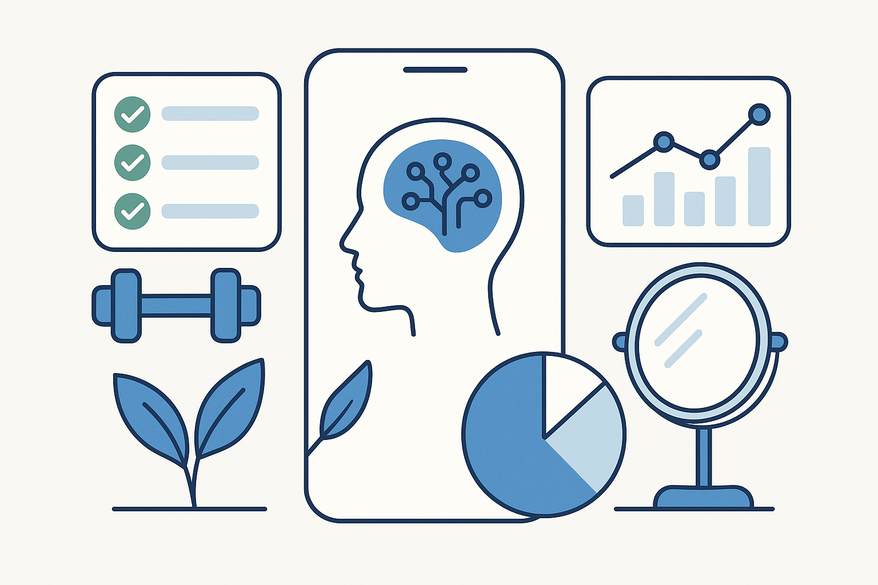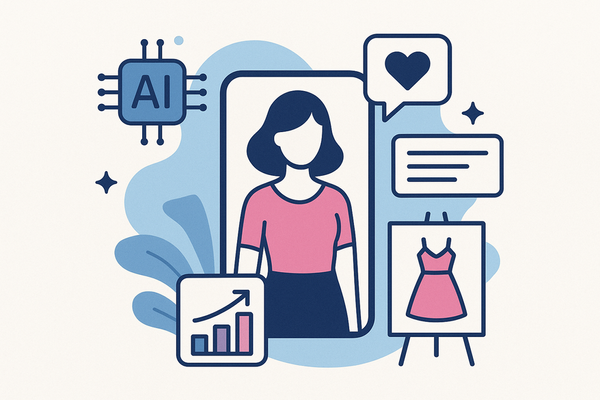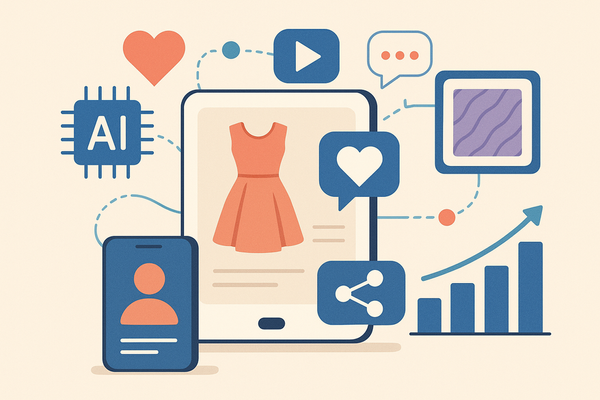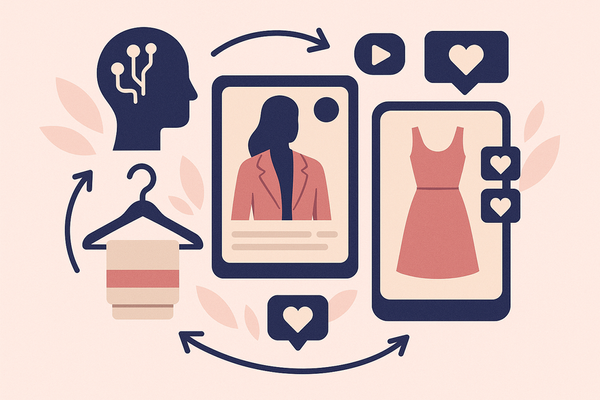The Ultimate Guide to AI Self-Improvement Apps
Explore AI self-improvement apps comprising habit tracking, progress monitoring, and personal KPI dashboards to achieve your appearance and personal growth goals efficiently.

Estimated reading time: 7 minutes
Key Takeaways
- AI-driven personalization: Machine learning adapts habit reminders, insights, and difficulty levels.
- Enhanced motivation: Real-time feedback and predictive analytics reduce decision fatigue.
- Top apps compared: Rocky.ai for micro-coaching, Fitbod for workouts, Headspace for mindfulness.
- KPI dashboard: Centralize habits, biometrics, mood, and appearance metrics in one view.
- Appearance tracking: Upload weekly photos and measurements to monitor physical transformations.
Table of Contents
- Introduction to AI Self-Improvement Apps
- Understanding AI Self-Improvement Apps
- How AI Enhances Habit Formation and Self-Improvement
- Benefits of Using an AI Self-Improvement App
- Habit Tracking App Comparison
- Progress Monitoring App Features
- Building Your Personal KPI Dashboard
- Goals Tracker for Appearance
- Evaluative Discussion – Matching Functionality with User Needs
- Conclusion
An AI self-improvement app leverages artificial intelligence and machine learning to log habits, track appearance KPIs, and deliver personalized growth plans. These smart self-help tools blend behavioral science with predictive analytics to guide you toward better routines and visible results.
As AI technology matures, its role in personal development grows. Modern apps adapt in real time—refining reminders, suggesting next steps, and analyzing data from mood entries or photos. This adaptive guidance helps users stay motivated, reduce decision fatigue, and achieve goals efficiently.
For those seeking a unified, AI-driven progress and appearance tracking solution, Maxx Report offers comprehensive analytics across looks, habits, and symbols in one app.
In this guide, we’ll demystify AI self-improvement apps, compare top habit tracking tools, explore progress monitoring features, and show you how to build a custom personal KPI dashboard. We’ll also dive into specialized appearance trackers and help you choose the right app for your needs.
Understanding AI Self-Improvement Apps
An AI self-improvement app is a digital coach that analyzes your behavior and delivers tailored suggestions. These tools ingest data from:
- Habit logs (daily tasks, streaks)
- Mood entries (self-reported well-being)
- Biometric or visual inputs (sleep trackers, photo uploads)
Core AI functions include:
- Pattern detection – spotting recurring triggers or barriers
- Adaptive reminders – adjusting frequency and tone based on engagement
- Personalized insights – recommending next steps or new habits
Real-world example: A user logs morning meditation and notes stress levels. The app’s AI spots a midday slump pattern and suggests an afternoon breathing exercise.
For specialized appearance goals, apps like How to Improve Facial Attractiveness offer science-backed aesthetic tips.
How AI Enhances Habit Formation and Self-Improvement
AI-driven habit formation goes beyond static checklists. Key enhancements include:
- Pattern recognition – Machine learning identifies optimal times, habit loops, and behavioral triggers.
- Dynamic feedback – Real-time adjustments in reminders, goal difficulty, and motivational prompts.
- Adaptive learning – AI refines strategies based on your engagement, progress trends, and setbacks.
Example: After missing two evening workouts, the app shifts your fitness goal from daily to every-other-day sessions and offers an upbeat motivational message.
Benefits of Using an AI Self-Improvement App
- Personalized recommendations: Algorithms adapt to unique patterns and evolving goals.
- Enhanced engagement: Continuous learning maintains novelty longer than static plans.
- Deep insights: AI surfaces strengths, blind spots, and progress plateaus that manual tracking misses.
- Efficiency gains: Timely, relevant prompts reduce decision fatigue and guesswork.
Habit Tracking App Comparison
Comparison Criteria:
- Key features – habit logging, goal setting, coaching
- AI functionality – personalization, predictive analytics
- UI/UX – ease of use, visual appeal
- Integrations – calendar, wearables, note apps
- Rocky.ai
• Features: daily habit logging, goal setting, micro-coaching
• AI functions: personalized prompts, adaptive goal refinement
• UI/Integration: vision-board style interface; syncs with calendars and notes - Fitbod
• Features: fitness habit logging, AI-powered workout planning
• AI functions: adaptive workout generation based on performance and fatigue - Headspace
• Features: meditation and mindfulness session tracking
• AI functions: session customization based on mood and usage patterns
Progress Monitoring App Features
What Is a Progress Monitoring App?
A tool that tracks goal advancement through quantifiable metrics—habit streaks, mood ratings, task completions—and presents data visually.
Why It Matters:
- Sustains motivation by making progress tangible.
- Enables accountability through real-time feedback.
- Supports data-driven adjustments before plateaus or burnout.
Building Your Personal KPI Dashboard
What Is a Personal KPI Dashboard?
A centralized interface that aggregates self-improvement metrics—workouts, habits, mood, appearance—into one real-time view.
Integration:
- Connect habit and progress data from multiple apps
- Sync biometric inputs (sleep, steps) for holistic insights
- Upload appearance metrics (photos, measurements)
Goals Tracker for Appearance
A specialized module for visual or physical transformation objectives—weight loss, muscle gain, skin health. User experience: upload “Day 1” photo, record weekly scans, and let AI highlight improvements or flag areas needing extra attention. For a practical example of this in action, see our guide on How a Transformation Tracker App Elevates Your Glow Up Journey.
Evaluative Discussion – Matching Functionality with User Needs
Framework: Align your profile with app strengths:
- Broad personal growth – prefer Rocky.ai’s holistic micro-coaching.
- Fitness and appearance – choose Fitbod for AI-driven workouts and physique tracking.
- Mental wellness – Headspace excels at adaptive meditation and stress relief.
Conclusion
AI self-improvement apps redefine personal growth by merging behavioral science with machine learning. We’ve defined key concepts, examined habit tracking app comparisons, explored progress monitoring features, and shown how to build a personal KPI dashboard. We’ve also covered specialized goals trackers for appearance and matched tools to user needs.
Start by experimenting with a couple of top AI apps, track your progress for two weeks, and choose the one that best sustains your motivation and delivers visible results.
FAQ
- What is an AI self-improvement app?
An AI self-improvement app uses machine learning to analyze your habits, mood, and biometric or visual data to deliver personalized growth plans and reminders. - How do these apps adapt over time?
Through pattern recognition and adaptive learning, the app refines prompts, difficulty levels, and recommendations based on your engagement and progress trends. - Can I integrate multiple apps into one dashboard?
Yes, a personal KPI dashboard can aggregate data from various habit trackers, fitness apps, mood logs, and appearance metrics for a unified view. - Are AI self-improvement apps secure?
Most reputable apps use encryption and privacy controls to protect your data. Always review the app’s security policy before sharing sensitive information. - Which app should I choose first?
Start with your primary goal: use Rocky.ai for holistic self-improvement, Fitbod for fitness, or Headspace for meditation, then evaluate which one maintains your motivation best.





